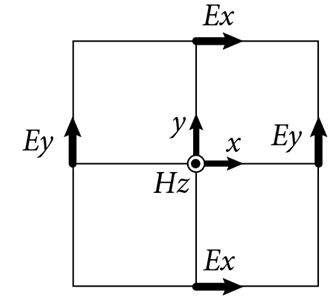Maxwell solver in two dimensions with FDTD scheme#
\[
\frac{\partial H_z}{\partial t} = \frac{\partial E_x}{\partial y} - \frac{\partial E_y}{\partial x}
;\qquad
\frac{\partial E_x}{\partial t} = \frac{\partial H_z}{\partial y}
;\qquad
\frac{\partial E_y}{\partial t} = - \frac{\partial H_z}{\partial x}
\]

\[
H_z \big|^{n+1/2}_{i+1/2,j+1/2} = H_z \big|^{n-1/2}_{i+1/2,j+1/2} +
\frac{dt}{dy} \big(E_x \big|^{n}_{i+1/2,j+1} - E_x \big|^{n}_{i+1/2,j} \big)
- \frac{dt}{dx} \big( E_y \big|^{n}_{i+1,j+1/2} - E_y \big|^{n}_{i,j+1/2} \big)
\]
\[
E_x \big|^{n+1}_{i+1/2,j} = E_x \big|^{n}_{i+1/2,j} + \frac{dt}{dy} \big( H_z \big|^{n+1/2}_{i+1/2,j+1/2} - H_z \big|^{n+1/2}_{i-1/2, j-1/2} \big)
\]
\[
E_y \big|^{n+1}_{i,j+1/2} = E_y \big|^{n}_{i,j+1/2} - \frac{dt}{dx} \big( H_z \big|^{n+1/2}_{i+1/2,j+1/2} - H_z \big|^{n+1/2}_{i-1/2, j+1/2} \big)
\]
import matplotlib.pyplot as plt
import numpy as np
from mpl_toolkits.mplot3d import axes3d
import matplotlib.animation as animation
from IPython.display import HTML
plt.rcParams['figure.figsize'] = (10,6)
# Mesh parameters
nx, ny = 101, 101
vx, dx = np.linspace(0, 1, nx, endpoint=True, retstep=True)
vy, dy = np.linspace(0, 1, ny, endpoint=True, retstep=True)
#Initialize Ex, Ey when time = 0
ex = np.zeros((nx-1, ny), dtype=np.double)
ey = np.zeros((nx, ny-1), dtype=np.double)
nbiter = 500 # time loop size
dt = 0.001 # time step
m, n = 2, 2
omega = np.sqrt((m*np.pi)**2+(n*np.pi)**2)
# Create the staggered grid for Bz
x, y = np.meshgrid(0.5*(vx[:-1]+vx[1:]), 0.5*(vy[:-1]+vy[1:]))
fig = plt.figure()
ax = axes3d.Axes3D(fig)
#Initialize Bz when time = - dt / 2
hz = - np.cos(m*np.pi*y) * np.cos(n*np.pi*x) * np.cos(omega*(-0.5*dt))
wframe = ax.plot_wireframe(x, y, hz, rstride=2, cstride=2)
ax.set_zlim(-1,1);
<Figure size 1000x600 with 0 Axes>
numpy#
def faraday( ex, ey, hz ) :
"faraday equation Bz(t+dt/2) -> Bz(t-dt/2) + dt f(E(t))"
return hz + dt * ((ex[:, 1:]-ex[:, :-1]) / dy - (ey[1:, :]-ey[:-1, :]) / dx)
def ampere_maxwell( hz, ex, ey):
" Ampere-Maxwell equation E(t+dt) -> E(t) + dt g(Bz(t+dt/2)) "
ex[:, 1:-1] += dt*(hz[:, 1:]-hz[:, :-1]) / dy
ey[1:-1, :] += - dt*(hz[1:, :]-hz[:-1, :]) / dx
# periodic boundary conditions
ex[:, 0] += dt*(hz[:, 0]-hz[:, -1]) / dy
ex[:, -1] = ex[:, 0]
ey[0, :] += - dt*(hz[0, :]-hz[-1, :]) / dx
ey[-1, :] = ey[0, :]
return ex, ey
def update(i, ax, fig):
ax.cla()
global ex, ey, hz
for j in range(10):
hz = faraday( ex, ey, hz)
ex, ey = ampere_maxwell( hz, ex, ey)
wframe = ax.plot_wireframe(x, y, hz, rstride=2, cstride=2)
ax.set_zlim(-1, 1)
return wframe,
ani = animation.FuncAnimation(fig, update,
frames=range(100),
fargs=(ax, fig), interval=20, blit=True)
%%time
HTML(ani.to_html5_video())
---------------------------------------------------------------------------
RuntimeError Traceback (most recent call last)
File <timed eval>:1
File /usr/share/miniconda/envs/python-fortran/lib/python3.9/site-packages/matplotlib/animation.py:1265, in Animation.to_html5_video(self, embed_limit)
1262 path = Path(tmpdir, "temp.m4v")
1263 # We create a writer manually so that we can get the
1264 # appropriate size for the tag
-> 1265 Writer = writers[mpl.rcParams['animation.writer']]
1266 writer = Writer(codec='h264',
1267 bitrate=mpl.rcParams['animation.bitrate'],
1268 fps=1000. / self._interval)
1269 self.save(str(path), writer=writer)
File /usr/share/miniconda/envs/python-fortran/lib/python3.9/site-packages/matplotlib/animation.py:128, in MovieWriterRegistry.__getitem__(self, name)
126 if self.is_available(name):
127 return self._registered[name]
--> 128 raise RuntimeError(f"Requested MovieWriter ({name}) not available")
RuntimeError: Requested MovieWriter (ffmpeg) not available
%%time
from tqdm.notebook import tqdm
nx, ny = 512, 512
vx, dx = np.linspace(0, 1, nx, endpoint=True, retstep=True)
vy, dy = np.linspace(0, 1, ny, endpoint=True, retstep=True)
ex = np.zeros((nx-1, ny), dtype=np.double)
ey = np.zeros((nx, ny-1), dtype=np.double)
dt = 0.001 # time step
m, n = 2, 2
omega = np.sqrt((m*np.pi)**2+(n*np.pi)**2)
x, y = np.meshgrid(0.5*(vx[:-1]+vx[1:]), 0.5*(vy[:-1]+vy[1:]))
hz = - np.cos(m*np.pi*y) * np.cos(n*np.pi*x) * np.cos(omega*(-0.5*dt))
for t in tqdm(range(1000)):
hz = faraday( ex, ey, hz)
ex, ey = ampere_maxwell( hz, ex, ey)
CPU times: user 1.65 s, sys: 792 ms, total: 2.44 s
Wall time: 2.43 s
%load_ext fortranmagic
fortran#
%%fortran
subroutine faraday_fortran( ex, ey, bz, dx, dy, dt, nx, ny)
implicit none
real(8), intent(in) :: ex(nx-1,ny)
real(8), intent(in) :: ey(nx,ny-1)
real(8), intent(inout) :: bz(nx-1,ny-1)
integer, intent(in) :: nx, ny
real(8), intent(in) :: dx, dy, dt
integer :: i, j
real(8) :: dex_dx, dey_dy
real(8) :: dex_dy, dey_dx
do j=1,ny-1
do i=1,nx-1
dex_dy = (ex(i,j+1)-ex(i,j)) / dy
dey_dx = (ey(i+1,j)-ey(i,j)) / dx
bz(i,j) = bz(i,j) + dt * (dex_dy - dey_dx)
end do
end do
end subroutine faraday_fortran
%%fortran
subroutine amperemaxwell_fortran(ex, ey, bz, dx, dy, dt, nx, ny)
implicit none
integer, intent(in):: nx, ny
real(8), intent(in):: dx, dy, dt
real(8), dimension(nx-1, ny-1), intent(inout) :: bz
real(8), dimension(nx-1, ny), intent(inout) :: ex
real(8), dimension(nx, ny-1), intent(inout) :: ey
integer:: i, j
real(8):: dbz_dx, dbz_dy
real(8), parameter:: csq = 1d0
do i = 1, nx-1
dbz_dy = (bz(i, 1)-bz(i, ny-1)) / dy ! periodic BC
ex(i, 1) = ex(i, 1) + dt*csq*dbz_dy
ex(i, ny) = ex(i, 1)
end do
do j = 1, ny-1
dbz_dx = (bz(1,j)-bz(nx-1,j)) / dx ! periodic BC
ey(1,j) = ey(1,j) - dt*csq*dbz_dx
ey(nx,j) = ey(1,j)
end do
do j=2,ny-1
do i=1,nx-1
dbz_dy = (bz(i,j)-bz(i,j-1)) / dy
ex(i,j) = ex(i,j) + dt*csq*dbz_dy
end do
end do
do j=1,ny-1
do i=2,nx-1
dbz_dx = (bz(i,j)-bz(i-1,j)) / dx
ey(i,j) = ey(i,j) - dt*csq*dbz_dx
end do
end do
end subroutine amperemaxwell_fortran
%%time
from tqdm.notebook import tqdm
ex.fill(0.0)
ey.fill(0.0)
hz = - np.cos(m*np.pi*y) * np.cos(n*np.pi*x) * np.cos(omega*(-0.5*dt))
ex = np.asfortranarray(ex)
ey = np.asfortranarray(ey)
hz = np.asfortranarray(hz)
for t in tqdm(range(1000)):
faraday_fortran( ex, ey, hz, dx, dy, dt, nx, ny)
amperemaxwell_fortran(ex, ey, hz, dx, dy, dt, nx, ny)
CPU times: user 772 ms, sys: 10.5 ms, total: 783 ms
Wall time: 778 ms


